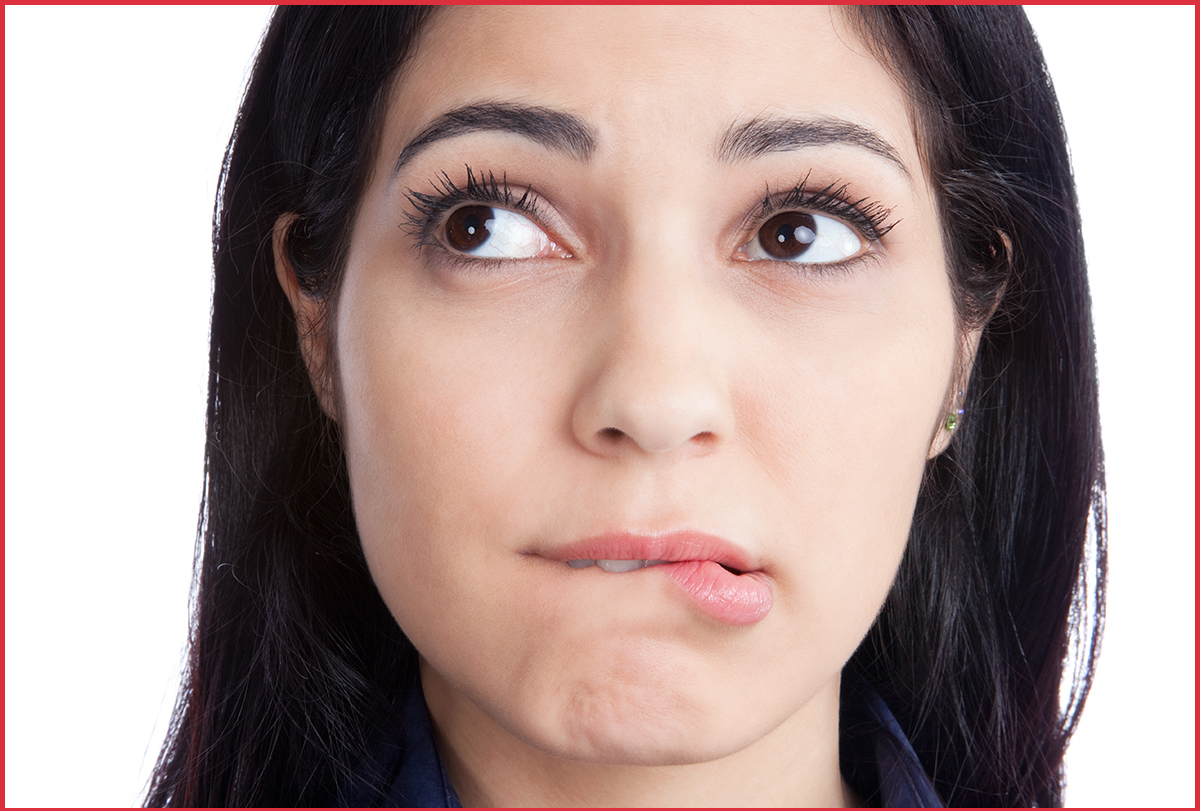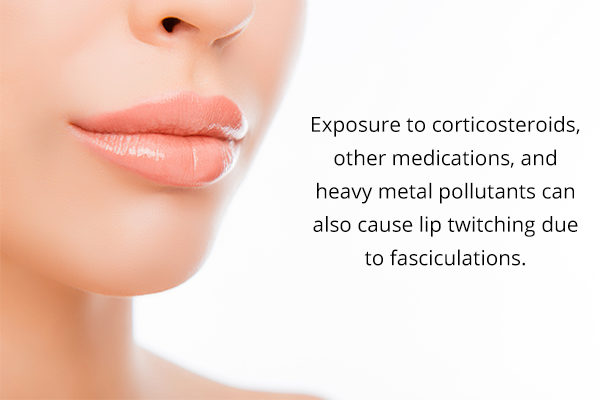In this article:
A strange feeling or movement in the lip can be perceived in several ways. The lip may quiver, tingle, burn, or contract involuntarily.

The sensation can be annoying, embarrassing, and frightening. The lips are composed of muscles covered by a mucus membrane and are made to move by the firing of the facial nerves.
Major Causes of Lip Twitching

In healthy people, the most common cause of small twitches in the lip is benign fasciculation. Fasciculation is a small, involuntary firing of a nerve cell. This can be caused by overconsumption of caffeine, stress, and fatigue. (1)
Sensitivity to gluten has also been found to be a cause of lip twitching along with other involuntary muscle twitching. This condition is resolved by removing the problem food from the diet. (2)
Fasciculations can also be caused by an imbalance in electrolytes. Potassium is needed to conduct and transmit nerve impulses to the muscles. If there is a potassium deficiency in a person’s blood, muscles in the lip and elsewhere in the body can start to twitch. (3)
Some foods that are rich in potassium are dried figs, seaweed, nuts, bananas, spinach, and beef. Too much potassium can be dangerous, so it is not a good idea to overload with it. (3)
Exposure to corticosteroids, certain medications, and heavy metal pollutants can also cause lip twitching due to fasciculations. Sleep apnea is also considered a trigger for lip twitching. Having the issue diagnosed and treated can solve the problem. (1)
Other Conditions That May Cause Lip Twitching

Several other common and uncommon conditions can lead to involuntary twitching of the lips:
1. Low calcium in the blood
Low calcium in the blood, or hypocalcemia, can result in lip twitching. The condition is treated with intravenous calcium and oral calcium supplements.
In pregnancy, low calcium is fairly common. The pregnant mother is passing her calcium to her fetus during pregnancy, and there is an uptick of this transfer in the final trimester. (4)
2. Neurologic movement disorders
Several neurologic movement disorders can also cause lip twitching. One condition that causes forceful muscle spasms on one side of the face is called hemifacial spasm (HFS). The facial nerve on the same side of the twitching is the culprit.
Sometimes, lip twitching is caused by abnormalities in blood vessels, injuries to the nerves, or tumors in the brain. In many people, there is no apparent cause for the twitching of the lips.
Botulinum toxin injections have been seen to improve the condition in 95% of patients with HFS. (5)
3. Parkinson’s disease
Some cases of lip twitching can be associated with Parkinson’s disease, but this association is rare.
4. Bell’s palsy
Bell’s palsy is a condition where the muscles suddenly become weak on one side of the face. That side of the face droops. The cause of Bell’s palsy isn’t exactly known, but it can be triggered by dental treatment, virus, or injury and inflammation of the nerve that controls the muscles of the face.
Due to the nerve injury, changes occur in the muscle it controls and the cells in the nerves. The nerves often regenerate, but sometimes they do not regenerate perfectly, which can result in twitching in the face or lip. (6) Most people with Bell’s palsy recover normally, but 15%–20% wind up with spasms or regeneration issues in the nerves. (6)
5. Tourette syndrome
Tourette syndrome is a condition that is characterized by involuntary tics or twitches, in addition to other symptoms. The tics can be infrequent and relatively mild or frequent and violent. Common tics may look like facial grimacing or pouting.
These simple motor tics often begin in childhood, are provoked by stress, and are associated with an urge to move the mouth. They can be distinguished from other causes of lip twitching.
Other movement disorders such as oromandibular dystonia and Meige syndrome cause forceful movements of the face and neck muscles where both sides of the face can begin to twitch. In most cases, the cause isn’t known, but disease of the brainstem is being considered. (7) Botulinum toxin injections are often used to treat these conditions. (8)
6. Seizure
Episodes of rhythmic twitching of the lip could be the symptoms of a seizure. These symptoms should be evaluated by a doctor and may require evaluation with brain wave tests or imaging studies.
Medical Treatment for Lip Twitching
The treatment for lip twitching depends on the cause, but in most cases, no treatment is necessary. When lip twitching is caused by certain neurological disorders, local injections of botulinum toxin or anticonvulsant medications are sometimes used.
Medications That Can Cause Lip Twitching
Lip twitching has been found to possibly be associated with the tapering off of corticosteroids.
These cases are not considered serious as they are not linked to serious neurological conditions. Treatment for benign fasciculation (twitching) is done for the symptoms present.
Sometimes anti-epileptic drugs are used to get partial control of the symptoms. After tapering off the corticosteroids completely, the twitching may stop. (9)
Is Lip Twitching Serious?
Many people become concerned because lip twitching can be a sign of a serious degenerative neurological disease called amyotrophic lateral sclerosis (ALS), more commonly known as Lou Gehrig’s disease.
Fasciculations or lip twitching alone is not diagnostic of ALS. ALS is a rare condition. A complete exam and testing, along with other symptoms, would be needed for a diagnosis of ALS.
Most people with ALS would have twitching in many areas of the body, as well as shrinking and weakness of their muscles. (1)
When Should Medical Help Be Sought?
Lip twitching is usually not caused by a serious condition. If it persists for more than a few days or you notice muscle weakness or other disturbing symptoms, you should see your doctor.
If you or your doctor feels you are consuming too much caffeine, sleep-deprived, or drinking too much alcohol, adjust these habits. Keep in mind that caffeine is found in supplements that you may not realize. Your doctor may decide to do blood tests, nerve conduction tests, and a neurological exam as part of a medical workup.
Myths and Facts About Lip Twitching

These are some myths about twitching lips that have no scientific basis but may be encountered on the Internet:
- “If your bottom lip twitches, something bad will happen.”
- “If your left-upper lip twitches, you will lose a friend or fight with close relatives.”
- “If your right-upper lip twitches, you will receive a lot of money soon.”
- “If your right-lower lip twitches, you will lose money.”
- “If both lips are twitching, you are about to meet a stranger.”
Final Word
The uncontrolled twitching of the lips can feel quite irritating and appear quite abnormal, but it is usually temporary and harmless. In most cases, the condition is triggered by common lifestyle or dietary factors that can be addressed through self-control.
For instance, you can take steps to manage everyday stress and fatigue while also limiting your caffeine and gluten consumption, all of which are prime culprits behind this condition. However, if the twitching becomes prolonged, severe, or frequent enough to cause you significant distress, it is important that you seek medical evaluation to rule out any serious underlying issue.
- Was this article helpful?
- YES, THANKS!NOT REALLY


